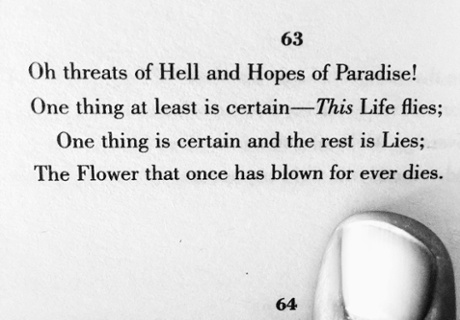
Welcome to this week’s blog. Here’s a roundup of your comments and photos from last week, including a reader’s love – and longing – for Infinite Jest, brilliant Urdu short stories, and thoughts on moving house and parting with (as many as 500) books.
ItsAnOutrage2 has just finished Rosa by Jonathan Rabb:
[It is] a murder mystery set in January of 1919 Berlin in the confused aftermath of Germany’s Socialist Revolution. Inspector Nikolai Hoffner seems to be in more danger from the various political factions than from his quarry. The political and social vacuum left by both the Revolution and the end of the war provides a fascinating time and place in which to set a thriller. Rabb uses this environment well and cleverly weaves snapshots of Berlin life and a few of its better-known inhabitants into the plot without it being in any way distracting. This is probably the first detective novel I’ve read in thirty years, and despite the fact that I didn’t find any of its well-drawn characters particularly likeable, I really enjoyed it.
istanbulpiers has just finished Infinite Jest by David Foster Wallace – and loved it:
Though it is long and fairly challenging in places (however, I warmed up to it by reading Pynchon’s Gravity’s Rainbow, which was substantially tougher) it is a highly entertaining read – cracking satire and wonderful, inventive use of language. Felt a little smarter by the time I’d finished, and kinda miss it already, one day after finishing it.
LeoToadstool finished Saadat Hasan Manto’s Selected Stories (translated from the Urdu by Aatish Taseer):
At his best, Manto bears comparison with the masters of the short story; each of Taseer’s selections presents an entire milieu in microcosm. Few of the famous Partition stories are included, but no matter: Selected Stories (published by Vintage India, hopefully it can get an international release in the near future) is a worthy introduction to Manto and a nice companion volume to Bombay Stories, another recent clutch of newly-translated stories which was published abroad last year. Taseer’s introduction covers not only Manto’s stormy career and his discovery of the writer while learning Urdu, but the interesting socio-linguistic phenomena surrounding Urdu’s decline in northern India and its ascendancy in Pakistan.
We’re seeing readers’ first thoughts after having finished Harper Lee’s Go Set a Watchman. judgeDAmNation’s take:
I finally managed to get my hands on a copy, and even after the first chapter I could see why she was told to go back and rewrite it from the young Scout’s point of view. Re-reading To Kill A Mockingbird the other week in preparation, I actually found the six-year old Scout quite annoying, but as a twenty-six year old in Watchman she is even more so; it’s like she hasn’t grown up at all, or at least only in the physical sense. The writing itself also seems overly intellectual in places, with everybody making wise-cracking remarks about literary figures or current political events, which almost makes me feel like I’m reading Don DeLillo (in this instance one of the least complimentary things you can say about a book), whereas Mockingbird was free of all that. I will endeavour to finish the book, but all I can really say is I’m glad I read Mockingbird first many years ago. If there is a third novel still lurking in another box somewhere, as some people seem to be hinting, I suggest they leave it there - or at least read it carefully before deciding to rush it out...
Finally, we enjoyed this conversation about moving house, parting with books, donating them and how libraries work.
Interesting links about books and reading
- The Literary Period Piece: Forever Current: are these the literary adaptations we deserve – and want? Judge for yourselves. On Literary Hub.
- The publication of the New American Stories anthology has sparked a bunch of interesting articles: Joel Breuklander dissects what this means for the state of the genre on Guernica; the editor, Ben Marcus, explains to Flavorwire why it’s more of a playlist than a “museum piece”; and Electric Literature publishes an extract of Marcus’s introduction to the collection, in which he talks about the “drug” that is language – and yet, “a short story cannot be smoked. You can’t inject it.”
- How Joan Didion Became the Ultimate Literary Celebrity: “A lot of the problems with writing about Didion are the same as writing about any celebrity. What you have access to is the stuff your subject has already released.” In The New Republic.
- How Not to Be Elizabeth Gilbert: one for the travel writing fans among you. On why we don’t still need women to tell us it’s fine to set up a life outside of marriage and family – “What we do need are more writers willing to break free of travel writing’s colonialist tendencies, whether expressed as contempt for backward others or admiration for their ‘authenticity’ and guidance.” In Boston Review.
- Stories From the Road: authors recount memorable moments on tour – from readers asking for fashion advice to poignant connections between writer and audience. In The New York Times.
New: If you’re on Instagram and a book lover, chances are you’re already sharing beautiful pictures of books you are reading, “shelfies” or all kinds of still lifes with books as protagonists. Now, you can share your reads with us on the mobile photography platform – simply tag your pictures there with #GuardianBooks, and we’ll include a selection here.
If you would like to share a photo of the book you are reading, or film your own book review, please do. Click the blue button on this page to share your video or image. I’ll include some of your posts in next week’s blog.
And, as always, if you have any suggestions for topics you’d like to see us covering beyond TLS, do let us know.

